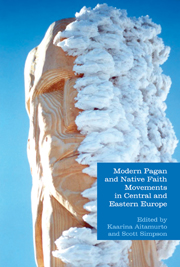Book contents
- Frontmatter
- Contents
- Contributors
- 1 Introduction: Modern Pagan and Native Faith Movements in Central and Eastern Europe
- Part I Overviews
- 2 A Postcolonial Key to Understanding Central and Eastern European Neopaganisms
- 3 Selected Words for Modern Pagan and Native Faith Movements in Central and Eastern Europe
- 4 Romanticism and the Rise of Neopaganism in Nineteenth-Century Central and Eastern Europe: the Polish Case
- 5 Russian Neopaganism: from Ethnic Religion to Racial Violence
- Part I Country Studies
- Part III Thematic Studies
- Bibliography
- Index
3 - Selected Words for Modern Pagan and Native Faith Movements in Central and Eastern Europe
from Part I - Overviews
- Frontmatter
- Contents
- Contributors
- 1 Introduction: Modern Pagan and Native Faith Movements in Central and Eastern Europe
- Part I Overviews
- 2 A Postcolonial Key to Understanding Central and Eastern European Neopaganisms
- 3 Selected Words for Modern Pagan and Native Faith Movements in Central and Eastern Europe
- 4 Romanticism and the Rise of Neopaganism in Nineteenth-Century Central and Eastern Europe: the Polish Case
- 5 Russian Neopaganism: from Ethnic Religion to Racial Violence
- Part I Country Studies
- Part III Thematic Studies
- Bibliography
- Index
Summary
Readers of this volume encounter a colorful spectrum of vocabulary used to identify religious practices from a number of Central and Eastern European (CEE) languages. Some will look like pure jabberwocky to English-speaking readers: Újpogányság, Neoyazychnytstvo, Rodzimowierstwo. Yet such terms cannot be simply and completely replaced by English translations. For example, the majority of the adherents of contemporary Slavic spirituality currently call their religion “Native Faith” (Ukr: Ridnovirstvo, Rus: Rodnoverie, Pol: Rodzimowierstwo, Cz: Rodnověří), and this term has its own separate history and associations in local languages. This chapter provides definitions and etymologies of selected words in various linguistic forms that allow us to unpack some of their anthropological and sociological issues.
Stakeholders in these words have different sets of issues. Etic scholars need precise and practical definitions, clear-cut taxonomies, and opportunities to make connections and comparisons with regional or theoretical issues. Emic practitioners are concerned about issues that are ultimately private, such as self-identity, ambition, or feeling that one's choice of names properly honors ancestors and gods. But in the public sphere, the choices of words and labels are akin to “brand management” for religions. An important theme in this chapter involves changing exonyms into endonyms and reclaiming pejoratives as positive identities. But even terms developed by the groups themselves, such as Ridna Vira, can undergo strong influences from many stakeholders and be applied differently than their inventors intended.
- Type
- Chapter
- Information
- Publisher: Acumen PublishingPrint publication year: 2013



